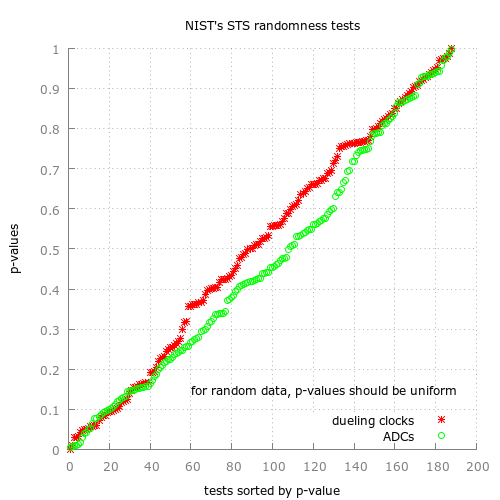proof-of-concept: generate random bits on LPC1768 using dueling clocks (systick and WDT/RTC)
random bits from dueling clocks
Using dueling clocks to generate random bits is described by Walter Anderson at https://sites.google.com/site/astudyofentropy/project-definition/timer-jitter-entropy-sources/entropy-library
There are implementations for AVR(UNO etc.) and ARM-based (teensy) MCUs.
This mbed LPC1768 implementation uses systick clock versus the RTC crystal (32khz) as a source to the WDT timer. The LPC1768 WDT interrupt cannot be cleared, so this implementation generates the random bits when they are requested. The WDT scales the source clock by /4, so the random bit rate is about 8192 bits/second. If your board doesn't have a 32khz crystal, it is also possible to source the WDT from the 4 MHz IRC oscillator.
I collected several megabytes of random bits and they passed various random-bit testers (rngtest, ent, NIST's STS).

Another mbed random bit generator using ADC noise and mixing with SHA256 is desribed at https://developer.mbed.org/users/Remco/notebook/secure-hardware-random-number-using-the-mbed and an mbed teensy 3.1 generator
One could also just use these generators to create a seed for a hash-based PRNG.
Some ARM chips have builtin hardware TRNG's (DUE, pyboard, Raspberry PI) and Intel Edison.
FYI, RNG data on other MCUs https://github.com/manitou48/DUEZoo/blob/master/RNGperf.txt
and Anderson's spreadsheet
https://docs.google.com/spreadsheet/pub?key=0AukiKiYKrSl9dHNIX19oZ0ZqNDc1RDNMa042SzhZT0E&output=html